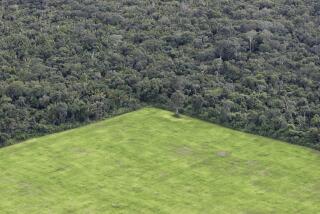Contadora Group Expected to Focus on Economics
- Share via
MEXICO CITY — When eight Latin American presidents gather in Acapulco for the largest regional summit in 20 years, they are expected to concentrate on the troubled--even desperate--state of their economies.
Thursday’s summit, the largest of its kind since 1967, will bring together leaders who are likely to issue a fresh plea for help to ease the foreign debt burdens that have drained their developing economies.
“We will have to say something about the debt,” Argentine President Raul Alfonsin said in an interview with the Mexico City newspaper Excelsior.
The summit, which ends Sunday, grew out of efforts to try to arrange a negotiated settlement of the wars in Central America.
In 1983, Mexico, Panama, Colombia and Venezuela formed the Contadora group, named after the Panamanian resort island where their foreign ministers first met. They were joined last year by a Support Group of Argentina, Peru, Brazil and Uruguay.
Their work, however, has been overshadowed by a regional peace plan signed in August by the presidents of Guatemala, Honduras, El Salvador, Nicaragua and Costa Rica. The plan calls for amnesties, cease-fires, reconciliation between governments and opposition groups, and reforms to bring about greater democracy in the area.
The eight countries have built up foreign debts totaling $343 billion, with Brazil leading the developing world at $112.7 billion.
The amount of money needed to stay current on the countries’ foreign debts--and some of the countries have fallen behind in their payments--is enormous. Mexico, for example, will pay $8 billion to $9 billion in interest this year on its debt of $105 billion.
The constant flow of money to industrialized nations, they say, has left their economies in sorry shape. Brazil, Mexico, Argentina, Uruguay and Peru are wracked by high inflation.
Mexico has pulled out of last year’s serious recession, but Peru may be headed for a downturn next year. Argentina, Brazil and Venezuela will likely record weaker growth this year than last.
“Latin America is the only region in the world with visible setbacks. Other continents continued to progress; we have not advanced,” Brazilian President Jose Sarney told the Mexican government news agency Notimex.
Brazil, he said, has disbursed $50 billion in debt payments--”a permanent bleeding that has debilitated our resources.”
He was expected to bring up at the summit the subject of a joint negotiating strategy with Mexico and Argentina. Peruvian President Alan Garcia, a hard-liner on the debt, was likely to repeat his call for Latin American nations to forge a united stand on the debt.
Also attending the meeting will be Presidents Miguel de la Madrid of Mexico, Eric Arturo Delvalle of Panama, Virgilio Barco of Colombia, Julio Maria Sanguinetti of Uruguay and Jaime Lusinchi of Venezuela.
The presidents will spend some of their time discussing the peace efforts in Central America, but their main focus will no doubt be on economic issues.
It is expected the leaders will discuss ways to strengthen their economic ties, with some talk of taking initial steps toward forming a European-style common market.
“Political agreement and economic integration is the only serious and concrete response that we can give to all the problems,” Alfonsin said in the newspaper interview. “I think that we are moving toward a type of community of Latin American nations.”
Brazil and Argentina last year agreed to cut tariffs on capital goods between the two countries, set uniform freight charges and create a separate monetary unit for bilateral trade. The agreements, they said, formed the “embryo of a Latin American common market.” Uruguay was to join later.
The nations would like to see more trade among themselves. They worry that protectionist sentiment in the United States will shut off sales in that highly sought after market.
They rely heavily on export earnings to pay their foreign debts.
Mexico and Venezuela, Latin America’s key oil producers, were hurt when crude prices on the world market tumbled sharply last year, cutting into their export earnings.
Since then, Mexico has begun a program to boost sales of non-oil goods. It also negotiated a $14.4 billion financial aid package with its creditors, which has helped eased its money woes.
Brazil, Peru and Argentina have had problems wringing more money out of bankers and financial organizations.
Brazil sent shock waves through the international financial community when it declared in February a moratorium on interest payments of about $67 billion of its debt. Earlier this month, it reached a provisional agreement with its bankers to pay $1.5 billion in interest due this year in return for $3.4 billion in refinancing.
More to Read
Sign up for Essential California
The most important California stories and recommendations in your inbox every morning.
You may occasionally receive promotional content from the Los Angeles Times.













